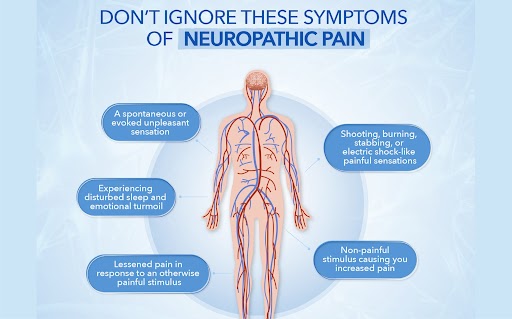Book an Appointment
Call Us+91 9319488481Neuropathic pain is a very common condition. A burning or shooting pain is a common indication of neuropathic pain. It might go on its own. It might be severe and persistent at times, or it can come and go. It usually arises due to a damaged nerve or a neural system failure. A change in nerve function at the injury site and in the surrounding tissues is the common cause of nerve damage.
Phantom limb syndrome is a form of neuropathic pain. This unusual syndrome arises when an arm or leg is amputated due to illness or accident, but the brain continues to receive pain signals from the nerves that once transported impulses from the missing limb. These nerves are now firing incorrectly, causing discomfort. Let’s learn more about causes and treatment options for neuropathic pain.

Nerve pain, or neuropathic pain, can occur when your nervous system is damaged or malfunctions. All levels of your nervous system, including your brain, spinal cord, and peripheral nerves can cause pain if there is any damage. Your brain and spinal cord make up your central nervous system. Nerves that travel to other parts of your body, such as your arms, legs, fingers, and toes, are known as peripheral nerves.
Neuropathic pain is caused by damaged nerve fibres that deliver incorrect signals to your body's pain centres. Both the location of nerve damage and certain regions of your central nervous system (central sensitisation) may exhibit changes in nerve function.
An alteration in one or more nerves or a disruption in their function is called neuropathy. Diabetes accounts for about 30% of cases of neuropathy, but hundreds of other illnesses, including shingles, HIV/AIDS, and alcohol use disorder, can also cause it.
Read Also: Chronic Pain: What It Is, Symptoms, Treatment In Hyderabad
Nerve pain manifests differently in each person. Some people experience it as a sharp pain in the middle of the night. Others may experience burning, tingling, or a persistent prickling sensation throughout the day. Nerve pain that is beyond control can be difficult to tolerate. However, it is often managed successfully with medication. Symptoms of neuropathic pain may include one or more of the following:
If your pain, numbness, or weakness is growing worse quickly, you should get immediate medical care. These signs may point to injury to the nerves. Other severe symptoms associated with neuropathic pain that needs immediate medical attention could be:
Read Also: Exploring Multiple Sclerosis Treatment Options in Bangalore: A Comprehensive Guide
Following are the causes that are responsible for triggering neuropathic pain can include:
Read Also: What is Advanced Neuro Rehab?
In addition to reviewing your medical history, your doctor will perform your complete physical examination. Your doctor will be able to identify common symptoms of neuropathic pain if they are aware of or suspect nerve damage. After that, they'll look for the root cause.
Treatment for neuropathic pain is based on what helps for your particular symptoms and the underlying cause. These variables will be used by your doctor to develop a personalized treatment plan for you. Neuropathic pain is usually managed with a combination of therapies. These therapies are:
Your doctor might suggest brain stimulation, spinal cord stimulation, or peripheral nerve stimulation if these therapies are ineffective for neuropathic pain. You can discuss the benefits and drawbacks of this kind of treatment with your neurologist.
Although neuropathic pain is typically not fatal, it can be challenging to treat. Combining rehabilitation with assistance for your mental, emotional, and social health will yield the best outcomes. With the assistance of a pain specialist and some of the previously listed techniques, the objective is to manage your pain and enhance your quality of life.
It is not always possible to prevent neuropathic pain. However, there are a few steps you may take to lower your risk:
Neuropathic pain can either be constant and severe or it might come and go. It can affect any part of your body and range in severity. Nerve pain can significantly lower your quality of life, even though it is typically not deleterious. If you experience persistent or severe nerve pain, consult your doctor. They can assist you in determining the cause and suggest the best course of action.
These were the causes of neuropathic pain and effective management strategies. Get accurate treatments from our expert neurologists to relieve nerve pain at Walk Again. Book your appointment now!
Q1: How is neuropathic pain different from other types of pain?
A: Unlike pain from an injury or inflammation, neuropathic pain results from nerve dysfunction, making it persistent and sometimes resistant to standard pain relief methods.
Q2: Can neuropathic pain be cured?
A: While some cases improve with treatment, neuropathic pain is often a long-term condition. Proper management can significantly reduce discomfort and improve quality of life.
Q3: How can lifestyle changes help manage neuropathic pain?
A: Regular exercise, a balanced diet, stress management, proper sleep, and avoiding alcohol or smoking can help improve nerve function and reduce pain.
Q4: Are there advanced therapies for neuropathic pain relief?
A: Yes, treatments like spinal cord stimulation, transcutaneous electrical nerve stimulation (TENS), and regenerative therapies offer relief for chronic neuropathic pain.
Q5: When should I seek medical help for neuropathic pain?
A: If you experience persistent nerve pain that affects daily activities or worsens over time, consult a healthcare professional for a proper diagnosis and treatment plan.